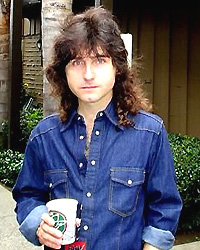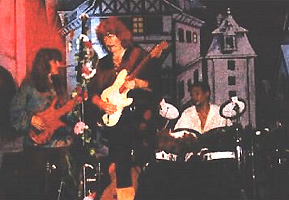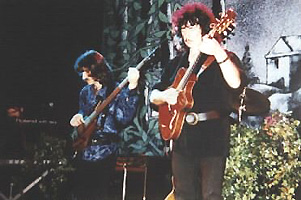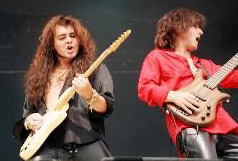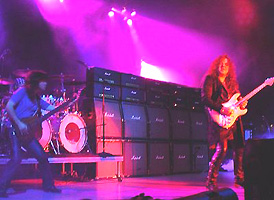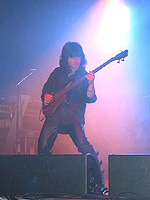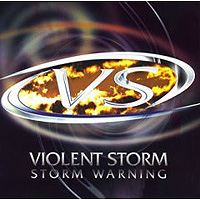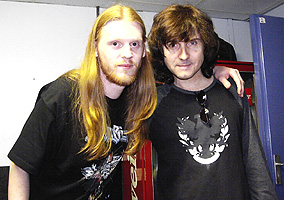|
An Interview with 'Mick Cervino'
Founder/Bassist of Violent Storm & Bassist of Yngwie J. Malmsteen’s Rising Force. that took pace in North Miami on Monday 9th July, 2007 Interviewed by Glenn Milligan (featuring Rick Wilson). Glenn: What was it like growing up in Beunos Aires, Argentina? Mick: Well as a musician I started playing professionally when I was 16, playing the bass. Before that I was playing the guitar for many years but I switched to bass when I was 14 or so when I discovered Ritchie Blackmore. I just thought the guy was too good and I couldn’t be as good as he was, so I decided to play something else and if I was good enough maybe some day I would get to play with him. It was very different (to Miami, Fl). I grew up in a middle class neighbourhood. My dad was a doctor, my mum was a Social Worker, so (I was) going to good schools and good social clubs and playing many sports – I played soccer, rugby, judo – all kinds of things. I started taking guitar lessons when I was 7, but I didn’t really get into the kind of music they were teaching me, which was argentinian folk music. I realised early on that Argentina wasn’t the place where I wanted to grow up. I didn’t want to continue there when I was an adult and I started making plans to leave the country when I was 12. In fact I had plans already with a friend of mine to leave on a weekend. I wanted to move to England because all my favourite bands were in England – Deep Purple, Black Sabbath, (Led) Zeppelin and I could see I was wasting my time there – that was when I was 12. So I had made a big plan to sneak out one night and hide with my friend in a boat/in a ship that was going to England and just had the whole thing worked out but my friend tells me, ‘I can’t go because I have to study for the test’, and I said, ‘What bloody test are you talking about?, You’re not leaving and going to England?’. So he chickened out and I though, I’ll waited until I am 18 and then I’ll go. (laughs) So I decided to leave Argentina early on. I didn’t like the economic situation there and the type of music that was going on there – well there was plenty of Rock, but it was Rock in Spanish and I didn’t feel right to my ear, because it was like singing a Tango in English – it wouldn’t work, so that’s the way I perceived it at that time. Glenn: How did it come about you getting the gig with Ritchie (Blackmore)? Mick: Well when I finally moved to England I was determined to meet Ritchie as I thought, ‘he is English, he must live in England’. I didn’t get to meet Ritchie in England but I met Ian Gillan. I was told then that Ritchie was in California at the time. I continued to get ready to get to play with him some day by learning all the Rainbow songs, all the (Deep) Purple songs just in case of a miracle if I ever got the gig – I had to be ready. So I moved to the (United) States and tried to get any leads to where Ritchie was and at some point I sort of lost hope – tried to give up the idea but all the while I continued reading about Ritchie and began to think in other terms. I thought, ‘he likes Classical music, he likes Bach’, so I started to get into that kind of music and began to learn classical compositions on the bass. I felt if I do this really well and some day I can get some of these recordings I am doing in Ritchie’s hands then he might be impressed. So I did a recording – a video of myself playing this classical stuff and then put it on a shelf and waited until it was the right time which happened in 1997. I heard that he was going to be reforming the last line-up of Rainbow. Through the Internet I found many addresses, his Management, his fan club and this ‘n’ that. So I made many copies of me playing one of Bach’s Two Part Inventions on the bass and apparently one of those copies got through to Ritchie and he eventually after a while he listened to it and I guess he liked it and asked his Manager to call me. That’s how the whole thing with Ritchie began. It was like a long shot and the odds were against it but I just feel I had to go for it and follow my dreams. Glenn: It was destiny waiting to happen. Mick: But I had to make it happen. Just about every one I knew tried to discourage me, ‘Oh what do you think, Ritchie is gonna be there waiting for you?’ and I said, ‘Well he has been known for replacing band members often, so I thought, ‘maybe at some point, maybe a bass player’s job will open’ and I had to make it happen. I tried to make it a point to be in the right place at the right time. Glenn: What’s he like to get on with Ritchie because we get the impression over here in the UK that he is very much a loose cannon – what’s he like on and off stage? Mick: He’s pretty much what everybody perceives him to be. He’s very playful, very demanding. He can sometimes take you off-guard but in my case I was prepared for all this. I knew his personality really well. Some of the things that went on while I was with him other band members didn’t expect at all, but I did. If you weren’t prepared for the rehearsals he would just tear you apart and I knew that, so I was always really well prepared. As soon as you laid the guard down and thought, “Ok, now I’m in, I can relax a bit”, you would have a miserable time in rehearsals and on stage the same thing. You had to always be on your toes because you didn’t know what Ritchie would come up with and you had to be ready to follow what he was doing on the spot. One day he asked the band, with almost no warning to change the key on a particular song that was quite difficult. He would use the excuse that it was better for the vocals - but it was really just a test.
Glenn: To see if you could manage it. Mick: Yeah.. Fortunately we all managed really well so we shut him up. So the next day he said, “Okay, you guys did it, let’s go back to the original key now. (We laugh) Glenn: So I suppose you got on with really well. Mick: I got on well with him for the most part. He was a bit paranoid at times which is something I knew about him too. We really became good friends, or at least that’s the impression I had. We’d play football together, we went to dinner all the time, we went to have drinks, etc. Then sometimes I would notice his paranoia in there and I was thinking to myself: ‘Don’t you know me well enough to know that I’m not out to get you, I’m on your side’ So some of those things hurt me a bit, but he was paranoid with just about everybody except Candice (his wife). Glenn: When you were on the road, what are some of your favourite concerts that stand out with Ritchie or just good times on the road, even when not on stage with tour pranks and stuff? Mick: Well he did do all those things (Tour Pranks) – but not as heavy as what he used to do in the old days with Rainbow for what I hear. I guess with Rainbow he had Cozy Powell who would also play tricks on everybody and heavier tricks than Ritchie I’m told. It was playful, juvenile stuff. While at castles in Austria and Germany he and I would go to the areas we weren’t allowed to, just to be being nosey. I can remember when a security guy found us and kicked us out, ‘You can’t be here’, ‘Okay sorry’, there was a lot of that going on – a lot of adventures and stuff. But he was like that at home too, like in a forest near where he lives – sometimes we’d go out and try to find this homeless guy that was hanging out there. We’d just be ready with black coats and hoods and have secret weapons that the guy didn’t know that we had in case he turned ugly to us – aggressive. It was really childish stuff. Sometimes I would practice in the basement where he has a bar and I would notice there was somebody walking around and obviously I knew that it was him, but I just continued as though I didn’t know there was anyone there, suddenly I would see him appear with a ghost mask and just standing near me – he wouldn’t say anything and then I would keep playing and he would disappear. (We laugh) That’s some of what you miss about Ritchie. Glenn: So what would you say have been some of your favourite concerts with him? Mick: I guess some of the 1st ones were the best. Our first show when I joined the ‘Blackmore’s Night’ project was in Tokyo, Japan in front of 5,000 people. Everybody was a bit nervous but it was unbelievable for me I was playing a show with him, to me was just the most memorable one. I just couldn’t believe I was there. He was a bit nervous himself I think that day because it was the first show that Candice would do as a front person and we all pulled it off really well. I think on the 1st or 2nd show we even played ‘Smoke On The Water’. Glenn: In that acoustic style? Mick: No, he would pick up the Strat and turn up the volume. We played also played ‘Man On The Silver Mountain’, Candice would sing some of the verses and the keyboard player would sing the rest – While I was just watching Ritchie. Sometimes it was very hard to concentrate on my parts because I just got into his playing so much. I mean, there were many inspiring nights that I think the first shows were the most memorable for me. Glenn: Did it seem strange to you to go and play an acoustic show as opposed to doing electric shows that you have been used to hearing in Rainbow? Mick: Well I knew while I was learning the songs how it was going to be. I mean, I didn’t know he was gonna give me an acoustic bass to play for most of the show. Initially he wouldn’t allow me to play my white bass that I had with a UK flag on the pick guard He said, ‘They didn’t have those in the 1500’s’. (We laugh)
Well of course they didn’t have his semi-acoustic guitars and synthesisers and electronic keyboards or electronic drums that the rest of the band was playing. They didn’t have those back then either, but those were allowed. The electric bass wasn’t. Glenn: Plus there was no electricity was there! (I laugh). Mick: But that was some of the things that you came to expect from Ritchie. I think he does it just to annoy people. Glenn: That’s classic that. Do you have a preference to working in the studio as opposed to live or do you have no preference and like both? Mick: I like both. Nothing gets the adrenaline going as playing live especially with these guys (Blackmore, Yngwie, Violent Storm) but I really enjoy recording in the studio because it’s the stuff that is gonna remain there and it has to be your best because if you mess up live, well – too bad but in the studio that’s what stays there permanently. Then again, other things happen while playing live that you couldn’t do in the studio because of the adrenaline thing – like sometimes you’re inspired to play a certain way that you couldn’t reproduce in the studio. It’s just what happens to Ritchie all the time even though he’s really, really good in the studio, he thinks its still not as good as playing live because of that inspiration that comes with the adrenaline. So to be honest they are very different things. Glenn: Are there certain songs you enjoy playing most from those periods – either from ‘Rainbow’ or from ‘Blackmore’s Night’? Mick: I personally learnt to enjoy the Renaissance music quite a bit. It was very delicate, very musical and the bass had to really be played well without overstepping the melodies – you really had to be careful and it was difficult initially but I really enjoyed it When I started playing, my idea was to play ‘Hard Rock’, playing Deep Purple, Rainbow or something like that but throughout my career as a bass player I have had to play many different styles of music and this was another one that I hadn’t done before. It was very enriching as a musician. Glenn: How did you go from working with Ritchie Blackmore to Yngwie J. Malmsteen was it because Yngwie liked a lot of Ritchie’s playing? Mick: Well I am sure that that helps. Once my time with Ritchie was through I now began to think ‘Who would I like to play with next?’ and the first person that came to mind was Yngwie, because I like Classical and I like Heavy Metal and Yngwie was the perfect mixture of both. So I approached Yngwie’s Management and of course I mentioned that I have played with Ritchie and that’s always the plus – because the thing is that most people who have played with Ritchie are well trained. Glenn: He won’t just take anybody. Mick: And even if you were somewhat an OK player when you came into it – the band – you know you are going to leave as a much better musician and Ritchie would tear you apart if you’re not and I think that Yngwie knows that and that’s why he’s comfortable trying out ex-Blackmores because we all went through that training so he wastes less time. The 1st tour I had to do with him (Yngwie) it wasn’t much rehearsal as a band – it was just a couple of days so he obviously trusted me and everybody else that was involved. A couple of us were ex-Blackmore’s - ‘Doogie (White- Vocalist) and I’ and I think he was comfortable with us. Glenn: How did you feel about being on the ‘War to End All Wars Tour’ with Yngwie? Mick: Well when he reformed the band, he had done most of that tour but he was still doing the South America leg, so I enjoyed that as well as the Attack tour and what came after because playing with Yngwie is quite an experience on its own. His music is so powerful with fast and amazingly crazy runs that you have to double what he does on the guitar, so it’s always challenging and it’s always great. It’s most enjoyable, especially coming from probably the quietest band I have ever played with which was Blackmore’s Night to go to such a loud situation with Yngwie. I was quite eager to go from one extreme to the next because that’s more what I thought I was supposed to be playing. He’s not a boring bass player when he does the bass lines in the studio for his own albums. I always had the liberty to add and change things a little bit but I don’t mind playing his bass lines note for note if I have to.
Yngwie & Mick Glenn: I suppose you get on with Yngwie really well on and off stage? Mick: Yes, for the most part. We agree on many things. He used to be a big Deep Purple fan as well, a big Ritchie fan so the background is similar and in other areas we also get along. We discuss political views, we like playing tennis and we do that a lot. Glenn: Like letting Yngwie win a game of tennis so he would play on the Violent Storm album. Mick: Well yeah. Glenn: Are there any concerts that have stood out with Yngwie? Mick: Every concert with Yngwie is memorable to me, because no matter what happens during the day or what setbacks you may encounter on the tours he always gives 100% to the show. He improvises a lot and the energy level is always to the max. Glenn: I remember seeing you at the Mean Fiddler in London and it was a memorable show because I’d never seen you guys before. Mick: I can’t remember the particular of all the shows, but it seems we must have made a good impression since we’re doing this interview. Glenn: Because there are that many of them. Mick: It gets to a point that they get all mixed up in your head and you forget where you are. You start playing and whatever happens, happens and if Yngwie has his sound going the right way and his guitar is in tune and things of that sort then the chance of it being a very inspiring night increases considerably. There are some similarities between Ritchie and Yngwie but as far as each of these guys days are going in the personal level, Yngwie and Ritchie are very different people. Ritchie is affected by his personal stuff consistently while Yngwie not – once he’s on stage he forgets about everything else and gives people…
Glenn: A good show. Mick: Yeah. Glenn: When you have not been involved with your own band ‘Violent Storm’ what are you involved with when not on tour with Yngwie? Mick: Well I’ve done home recordings a lot, in preparation for Violent Storm, without knowing when that’s going to happen. So just laying down ideas and during my spare time I also teach, session work here and there but that’s pretty much what I do. Glenn: What session work have you done? Mick: I’ve done session work with people in Argentina, people in England, people in Spain and in the States people that you probably won’t know – people that are well known in those places except for the States. In the States I did sessions with different people – nothing that became major. But really it got to a point for many years I was a student from everybody else – I just wanted to concentrate on different things. I’ve done some weird stuff on my own like some psychedelic progressive punk stuff, that’s something that I hope I will someday do in another band situation in a more humorous environment. Sometimes when you hear humourous stuff it lacks the intensity. It lacks the virtuoso aspect or the musicianship to make it more interesting. So what I was doing was more like a mixture of that. Someday I’ll do that but not for a while. Someday. Glenn: I know that Yngwie puts all the bass lines on the albums, but have you ever thought, “I wish I could put some of the bass-lines down”? Mick: It doesn’t bother me. Initially when I joined the band I knew that Yngwie tended to play his own bass-lines. I even approached him initially to say “well for the next album if you want me to play a couple of songs I’ll be happy to – just so you know and I won’t even charge you”. But I heard Yngwie say once that in the past even before I came along that every time that he let other people play bass-lines he’s never been very happy with the end result. So he got to a point where he prefers to play his own bass lines and I respect that. Like certain guitar parts, rhythm parts, I prefer to play them myself in my own projects even though I am mostly a bass player but I have some very definite ideas of what I want the rhythm guitar to do and rather than teach it to somebody else to play it, I’ll play it myself. The same with him, he comes up with some brilliant bass-lines so by the time he shows it to me and I learn it, he saves money and time just doing it himself so that’s fine with me. Glenn: What would you say are the hardest bass-lines you’ve had to learn that Yngwie’s come up with that stand out? Mick: There was a particular song that he did that he wanted us to learn for rehearsal that we would never actually play live and I can’t remember the name of the song. It was a melodic soft song that he used a fretless bass on – a beautiful bass-line but it was a bit of a work-out to learn from the Attack album. Yngwie fans may know the ones I’m talking about, I don’t know the name but other than that ‘Rise Up’ is one that comes to mind. The riff that the guitar does is same as what the bass does and it’s just a thousand miles per hour – really cool and initially it’s like “What the hell is he playing there?”
(Mick In Dusseldorf, 2003) Rick: Do you learn these lines note for note? Mick: Yeah. It’s a challenge. Rick: How do you do that, do you slow it down? Mick: Nope, what I do initially, say it’s an 8-bar riff, I listen to it and figure out the most obvious notes, so once I get those it’s a matter of just seeing what happens in between and then you just learn those. I like to learn them at the right speed because it’s more challenging for me. I think it’s cheating if you slow it down or to have somebody else show it to you. Rick: Right. Mick: I learnt from the classical stuff that I was talking about earlier, I learnt it all by ear the Two and Three Part Inventions that are done on keyboards. Some of which are quite fast and I wasn’t relying on the music scores. I tend to pick it up quicker by ear than I do by reading, so after going through all that training, Yngwie’s stuff didn’t seem that difficult. Rick: A lot of it falls into place from what you have done in the past and what he’s into – it’s like a jigsaw puzzle that. Mick: Yeah, I mean Yngwie tends to use different modes than the ones uses on some Bach pieces but you became used to the challenge of picking up difficult stuff by ear and usually I pick it up like that – fast at its fastest. Glenn: So I guess that Violent Storm came to be because you had the chance to bring out yourself , the whole material, the bass-lines and the whole thing. Mick: Well with both Ritchie and Yngwie, I didn’t get much of a chance to record. With Ritchie I recorded one album. Initially I recorded 6 songs for that album but then Ritchie changed his mind about arrangement and whatever so he ended up recording some of the bass-lines himself or with bass synthesisers or things of that sort, so it’s a bit disappointing after say 3 years with Ritchie, 5 or 6 years with Yngwie and never get to play on the albums so I got to think, ‘What the hell!’. So I’d been writing songs all these years and I thought it was time to do my own thing and call my own shots and see what happens, so that’s how Violent Storm came about. Glenn: So how did it come to be ‘Violent Storm’ did you come to thinking, ‘Who would I like to play on my album?’, you must have had an enormous list of people? Mick: Well not as many as you’d think because I didn’t want it to be an all-star band. I had a drummer that I had played with before that ended up recording 3 songs on the album – that is the guy who came with us on the last tour. I had to audition different people, just trying to find the right person and it was not easy really. We found a singer initially for the demo but it didn’t work out as a person. Then we found another guy – I heard his demo and he had nothing to do musically with what I was doing but I just saw something in his voice that I thought I could apply to what I did – so that’s the guy that finally ended up singing on the album – and the guitar player – that was very, very difficult to find somebody. I ended up playing most of the guitars except for the ones that the guest musicians played like KK Downing and Yngwie J. Malmsteen and there was a guy that played on one of the songs that we considered as a band member but we soon realised it wasn’t going to work, we kept his track anyway because it was decent and we were under a bit of pressure to release the album in Japan so we just figured to keep it. I did the rest but obviously to play live we need the full band so we began auditioning different people for the live performances.
Glenn: What would you say your favourite songs on the album are? My personal favourites are ‘Deceiver’ and ‘Fire In The Unknown’. Mick: Well since I wrote most of the songs apart from the Blackmore’s Night cover song that we do which is ‘The Storm’, to me they all mean something special and I can’t tell you that one is my favourite over another one. To me, the songs follow my mood in different stages of the recordings and even now when I listen to the album it depends on what mood I’m in. Sometimes I’m in a fast driving mood so I listen to ‘War No More’ or ‘Fire In The Unknown’ but sometimes when I am in a more rebellious mood I am in more of a p*ss*d off mood I listen to ‘You Don’t Care’ or ‘Deceiver’. Writing and recording those songs I envisioned people running through the different problems in their own lives – some of them I imagine teenagers when they go through difficult stuff at home and they feel their parents don’t understand them, they feel that nobody cares and it’s how ‘You Don’t Care’ came about. Glenn: How did KK Downing become to getting involved in it all? Mick: I met KK a few times throughout the years when playing with Yngwie. He came to see us and I went to see (Judas) Priest a couple of times. We got on well then I mentioned the project and he seemed interested to see what it was about and I simply just said to him, “Well Yngwie is a guest musician on the album, would he like to be a guest musician too?”. He said, “Let me listen to it”, and then he said, “Why not!”, so then he became much more involved as time progressed. He had lots of opinions and things that he wanted to be part of. So that’s kind of how it happened, he became the Executive Producer of the album because he was so into what was going on, so it all went well and he was suggesting things here and suggesting things there, so he assumed the role naturally. Glenn: Nice One. Was it good to get the original singer of the album ‘Matt back involved with the band? Mick: For the next tour? Glenn: Yeah. Mick: Well he contacted us while we were on tour in Europe and he just happened to be there and I get the feeling that he probably felt he should be there - that’s why he contacted us. But we’ll see how things work out for the next tour. We were unfortunate that we couldn’t have him for the first one but hopefully he will be on the next one. Glenn: What particular concerts or support slots are you planning at the moment? Mick: Nothing is confirmed at the moment, there’s many things on the works going on behind the scenes but I can’t really talk about much of that due to superstitious reasons. As when you say something will definitely happen it never does. Glenn: I suppose you will be looking forward and doing a tour soon. Mick: We will be rescheduling some of the tour dates in Europe but we don’t have the dates down yet. We are hoping if all goes well to play around in the United States. Glenn: And in the mean time you will be checking out new musicians to be in the band? Mick: Yeah, I mean the band is pretty much there already it’s just a matter of getting together and rehearsing a few things but it’s all ready to go. Glenn: Are you looking forward to working again with Yngwie to tour his new album? Mick: Well if all goes well, Yngwie at this time is doing his new album – he is focussed on that in the same way I am focussed on Violent Storm and to tell you my priorities are with Violent Storm because that’s my baby and if I’m available and Yngwie still wants me to play with him – Great. But while Violent Storm is busy that’s where I’m gonna be. Glenn: That’s good. Mick: Yep. Glenn: Cool. Mick: Alright man, cool.
Thanks Again to Mick for a
real enlightening, interesting interview and special thanks go to Denise
Love (for setting it up with Mick),and my good friends Rick & Crystal
Wilson. |
